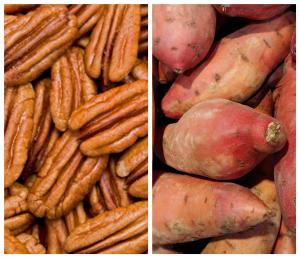Sweet potato is a tropical plant which, despite its name, is not related to potatoes. It is a nutritious food rich in vitamin A and C, antioxidants and phytochemicals. Furthermore, sweet potatoes are also a drought-tolerant vegetable, valued for their resilience in diverse agricultural systems. The adaptability of sweet potatoes to different climates and their ability to thrive in a variety of soil types have contributed to their widespread cultivation.
The adoption of a UNECE recommendation for sweet potatoes this week will ensure product quality and fairness in trade, thus enhancing sustainable development outcomes. The standard was initiated by Germany and South Africa.
Sweet potatoes are becoming an important part of our cuisine: mashed sweet potatoes (American cuisine), sweet potato fries (international fusion), sweet potato gnocchi (Italian cuisine), roasted sweet potato and chickpea salad (Mediterranean cuisine).
According to the Observatory of Economic Oversight, the main exporters in 2022 were the United States, followed by the Netherlands, Egypt, Spain, Viet Nam, Canada, Belgium, Japan, and Portugal.
“Sweet potatoes play a significant role in food security and poverty alleviation. It is a staple food for millions of people around the world, especially in developing countries, providing a source of affordable and accessible nutrition,” explained said Cyril Julius, Chairperson of the UNECE Specialized Section on Standardization of Fresh Fruit and Vegetables, and Chief Operations Officer of the Perishable Produce Exports Certification Agency of South Africa. “That said, it has significant importance in trade as well, creating income opportunities and contributing to economic growth in agricultural sectors. Having a standard for sweet potatoes levels the playing field, allowing growers, exporters and importers to trade with confidence.”
New standards for pecan kernels and in-shell pecans
The UNECE Working Party on Agricultural Quality Standards (WP.7) also adopted two new standards for pecan kernels and in-shell pecans. Pecans rank as one of the top 15 foods with the highest levels of antioxidants. They are loaded with vitamins and minerals like manganese, potassium, calcium, iron, magnesium, zinc, and selenium.
The pecan tree can live up to 300 years, during which it can produce fruit every year once it reaches maturity. Pecans play a key role in many cuisines, for example maple pecan salmon (Canadian cuisine), pecan and cranberry couscous salad (Mediterranean cuisine) and pecan pie (American cuisine).
“These new standards reflect the growing importance of pecans in the international trade and consumer diet. They seek to deliver quality pecans to consumers,” said Dorian LaFond, Chair of the Specialized Section on Standardization of Dry and Dried Produce.
After record production in 2020/21 and a slight dip in 2021/22, the global pecan crop rebounded in 2022/23 to an estimated 154,266 metric tons (kernel basis), a 9% increase over the previous year. Mexico and the United States led the world production in 2022/23, accounting for 44% and 40% of total production, respectively. South Africa came in third place with 10%. The adoption of quality standards for pecan kernels and in-shell pecans is important for facilitating global trade of pecans.
Note to editors
UNECE has developed over 100 agricultural quality standards for fresh fruit and vegetables, dry and dried produce, meat, seed potatoes, cut flowers, eggs and egg products. The standards are used internationally by governments, producers, traders, importers and exporters. The use of their common terminology and harmonized requirements helps buyers and sellers understand the quality of the products being marketed, thus reducing transaction cost and risk, while also enabling price differentiation for higher quality produce. The standards are thus an important component of a broader system of quality assurance and control supporting international trade.
UNECE standards also form the basis for agricultural quality legislation in a number of countries. For example, in the EU, trade in the 10 most traded types of fresh fruit and vegetables (apples, citrus fruit, kiwi, lettuce, peaches and nectarines, pears, strawberries, sweet peppers, table grapes and tomatoes) have to comply with specific marketing standards of the EU, which are harmonized with UNECE standards.
Recommendations imply that the standard is on trial for a period of up to two years. To help ensure that the standards are applied consistently, UNECE collaborates with the Organisation for Economic Co-operation and Development (OECD), which publishes explanatory colour brochures for producers, traders, and inspectors. UNECE also collaborates with the Secretariat of the Codex Alimentarius Commission in its standard-setting work.


